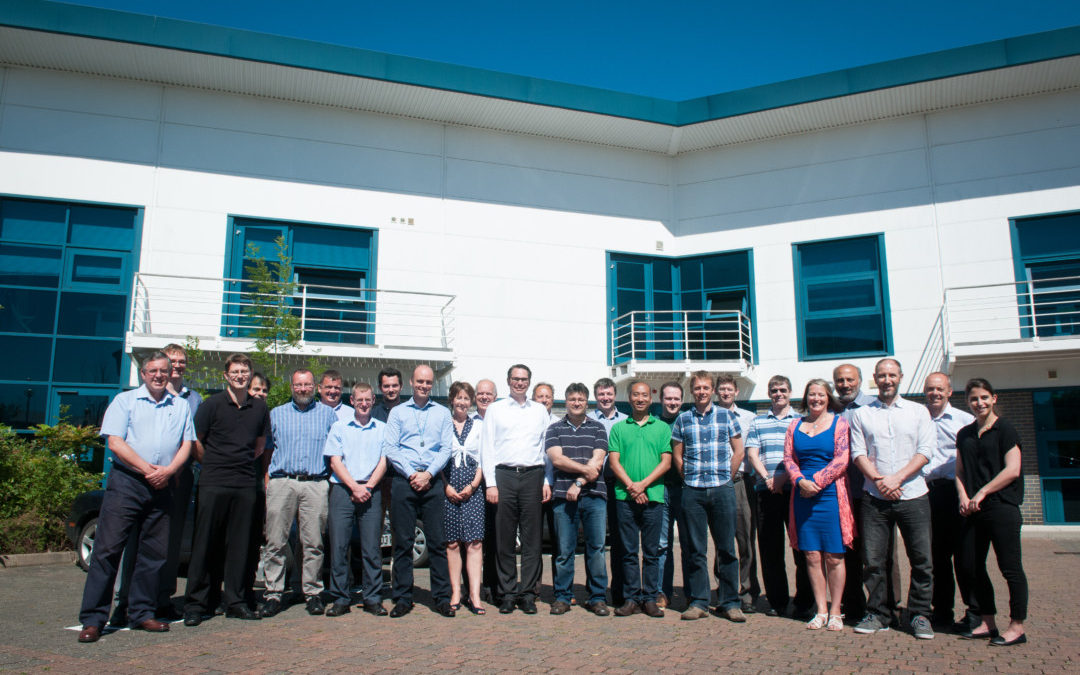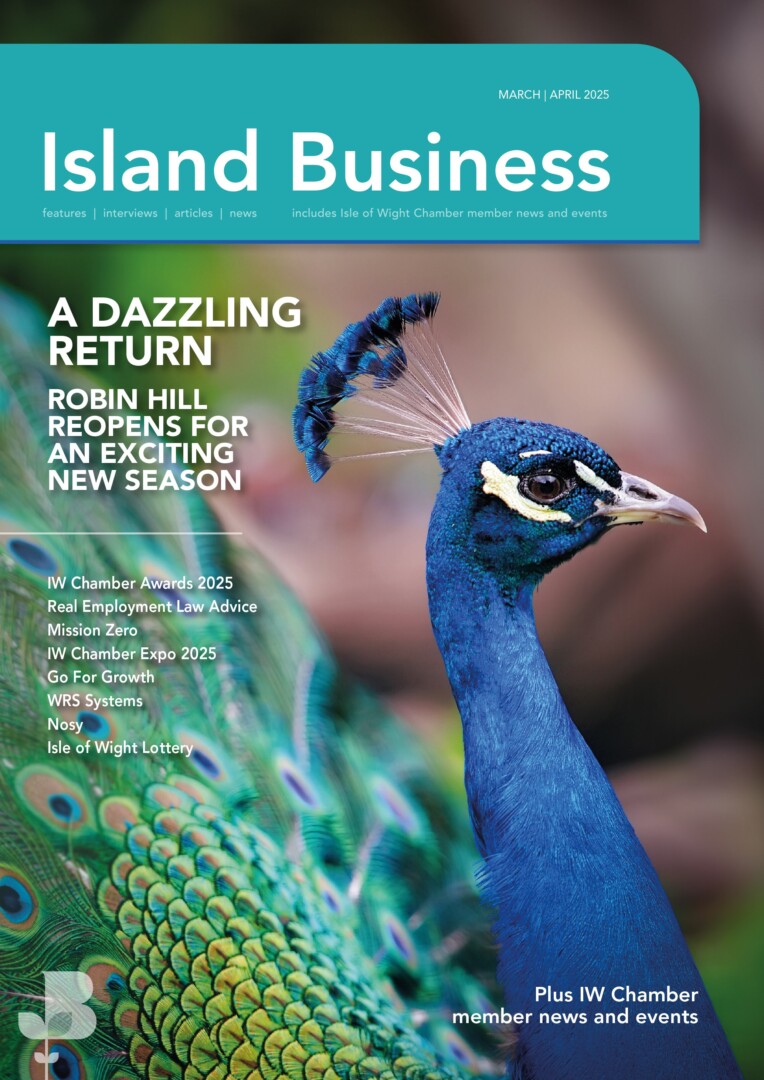They’re the Newport business with an international order book – named “Business Of The Year” at the 2015 Business Awards For Excellence, as well as collecting the International Business and Manufacturing and Technology prizes. Tom Stroud meets the winning team.
These are exciting times for Newport based technology company RFEL. The business specialises in high performance electronic signal processing solutions and the company has a bulging order book and a growing team. They’re no stranger to awards, winning the Queens Award for Industry twice along with Elektra European trophies, but it was their hat-trick of gongs at the 2015 Business Awards For Excellence that provided their first recognition from the Island.
“We’re really proud,” says CEO Dr. Alex Kuhrt. “We hadn’t entered before but we felt that the time was right in 2015. Our business is changing – we’re moving into production and we’re looking to engage with the local supply chain much more than we had in the past. We’re also broadening our skillset and we’re looking to recruit more local engineers and raise our profile.”
RFEL serve military, governmental and high-end industrial clients. The UK makes up a third of their business, with half in Europe and the rest in the US. Customers include the Ministry of Defence, Selex, Thales and many other major international clients. While global diplomatic uncertainty is generally bad news for the stock market, those in the defence sector are responding differently to difficult times.
“Our sector is government and military so we follow that economic cycle,” Alex says. “The sector is growing, probably due to the global situation. RFEL’s competition has always been the internal design teams of our customers, a lot of whom are now downsizing in those areas of expertise. They’re relying more on suppliers like us, and as we grow we can work with them, supplying hardware as well as software.”
RFEL has grown significantly in the last year, with the team rising to 28 employees, an increase of 6 people in 2015 and with another two set to join the company in 2016. The expanded team reflects growing take-up of RFEL’s product range.
“Our intake rates have been increasing by 30 to 50 per cent each year since 2012. Turnover is also increasing by 30 per cent each year since 2012, so we’re getting where we want to be. It’s exciting but it has its own challenges, because we have to grow fast enough but not too fast, in order to satisfy the orders coming in. You need to pick the right time to take people on, so that you’re not overstretched, but also allowing people to adapt to the way in which the company works, otherwise you can lose your company culture and your uniqueness. It’s a continuous challenge, because a growing company is always running at 110 per cent.”
RFEL began in 1999 as RF Engines Limited, created by two founders who lived and worked on the Island. They built the business by recruiting employees from the existing technology and defence sector. In 2009 the company was acquired by a customer, Rheinmetall, one of the largest defence technology suppliers in Europe, who are based in Dusseldorf. The new parent company sent Alex Kuhrt over to the Island a year later. Alex was born in North Germany and had always wanted to work in England. He joined RFEL during “a difficult phase” at the tail-end of the financial crisis, when budgets had been slashed and government departments were suffering the toughest spending cuts. Alex arrived on a snowy and chaotic day in winter 2010 and was promoted to CEO a year later. Back then the company was based at the Innovation Centre, employing 19 people. With a background in mechanical engineering, software development and project management, Alex wanted to make some changes.
“I knew that we needed to extend our business. We were focused on signal processing and so we moved into video processing too. It was a big risk entering a new market but we needed to do that and the investment has paid off. We moved into manufacturing later on, after a slow start. We always had the capability to manufacture a product line but we only really moved into that in the last three years. You need to understand your client base, to build the right system at the right price for the right application, ideally in an innovative and modern way, especially for specialist systems. We don’t have mass production for our sort of product so it’s important to get it right.”
RFEL’s serves a worldwide market, so the team attends around seven trade shows each year, with around half of those in the UK. Sales representatives travel every week to the UK mainland, Europe and North America. Alex says that mainland trips for his team are “usually to Gatwick or Heathrow” and he says that being on the Isle of Wight does affect the way in which they operate.
“It would be different in many ways if we were a mainland company. We can’t usually recruit locally and the Island can be a barrier for recruiting skilled people. We have compromised, offering the chance to commute here for half the week and work from home at other times. It’s forced us into a more modern way of working which is good. Software development is web-based so we’re able to do this, although it’s not the preferred way. The Island is a brilliant place to raise a family so some of our team have chosen to relocate here for that reason. Some very experienced engineers have settled here at the later stages of their career so we’ve inherited quiet a lot of experience. Graduates don’t tend to come here, although we have a new member of the team moving over from Paris so it is very varied.
“The Island has so many high-tech companies, not just in the maritime sector but also world leading electronics companies. We all try to encourage young people to come over. It would definitely help if the cultural environment on offer was stronger. If you compare the Island to a city like Brighton, Bristol or Reading then I think the Island is lagging behind when it comes to attracting families of high-skilled workers. The Island definitely is beautiful and has a lot of positive aspects too. Our customers want to come here and they like to cross the Solent. From a sales point of view it’s actually a positive.”
Alex is keen to work with Island businesses where he can. The majority of RFEL’s imported supplies are printed circuit boards which have to be sourced internationally, but surrounding metal work and mechanical design services are locally sourced, along with marketing, printed brochures. “We try to keep a local footprint on our supply chain as much as possible. It’s convenient but we want to help the industry footprint on the Island,” Alex says.
Visitors to RFEL’s site on the St Cross Business Park are greeted by an impressive collection of trophies on display in reception. Alex’s newly acquired trio of Chamber Of Commerce Awards are in good company! RFEL won the Queen’s Award for Enterprise in the Innovation category in 2012, as well as back in 2009. In 2014 Alex’s team was named ‘Company of the Year’ and ‘Design Team of the Year’ at the Elektra European Electronics Industry Awards.
“Winning awards validates the work that we do,” Alex explains. “We can judge our success on the number of units sold, but for an engineer it’s a different thing to be recognised and rewarded for their effort, invention and innovation. 80% of the company are engineers so it’s a huge achievement for them and extremely important for us as a business. It’s an external recognition and that’s very important too. We’re very proud of our achievements.”
2016 looks set to be another record-breaking year for the company and Alex has a plan for the next five years. The business is committed to its Island home and their expanded building can cope with another 10 members of staff. That’s not necessarily the plan though, as Alex wants to work smarter and increase productivity by working harder.
“We want to continue to grow in production numbers rather than the number of employees. I have a great team and we try to move forward by taking sensible decisions as a team. Our challenge now is to continue to drive growth and maintain our momentum. I want us to not become satisfied with our achievements and to continue to try harder.”
First published in the January issue of Island Business magazine.



